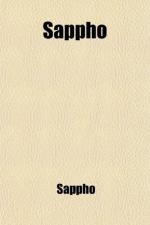|
This section contains 7,009 words (approx. 24 pages at 300 words per page) |

|
SOURCE: Warren, Rosanna. “Sappho: Translation as Elegy.” In The Art of Translation: Voices from the Field, edited by Rosanna Warren, pp. 199-216. Boston: Northeastern University Press, 1989.
In the following essay, Warren details the influence of translated Sapphic poetry on such writers as Catullus, Charles Baudelaire, and Algernon Charles Swinburne, with a principal focus on Sappho's poem known as “Phainetai moi.”
Our dreams pursue our dead.
Swinburne, Ave atque Vale
Ille Mi Par …\
He's like a god, that man; he seems (if this can be) to shine beyond the gods, who nestling near you sees you and hears you
laughing low in your throat. It tears me apart. For when I glimpse you, Lesbia, look—I'm helpless: tongue a frozen
lump, and palest fire pouring through all my limbs; my ears deafened in ringing; each eye shuttered in night. …
You're wasting your time, Catullus, laying waste to your life...
|
This section contains 7,009 words (approx. 24 pages at 300 words per page) |

|


